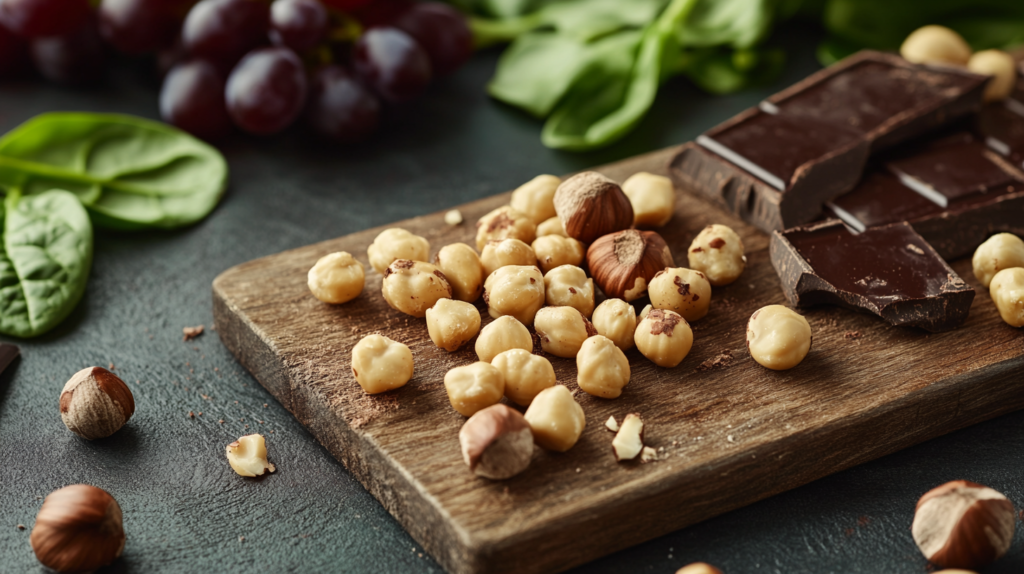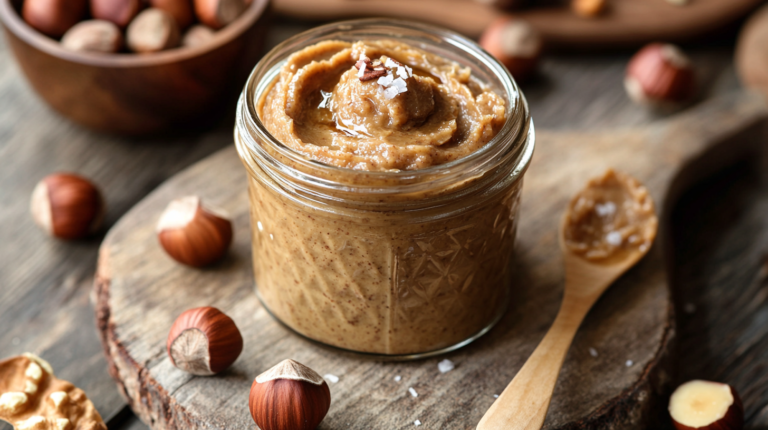Hazelnuts and Cancer Prevention: How Nutrients and Antioxidants Reduce Risk
Hazelnuts and Cancer Prevention: Hazelnuts, also known as filberts, have gained significant attention in recent years for their potential role in reducing the risk of cancer. These nutrient-dense nuts are not only delicious but also offer a wide array of health benefits, particularly in the realm of cancer prevention. Let’s explore the various ways in which hazelnuts may contribute to lowering cancer risk and the scientific evidence supporting these claims.
Nutritional Profile of Hazelnuts
Before delving into the cancer-fighting properties of hazelnuts, it’s essential to understand their nutritional composition. Hazelnuts are rich in various nutrients that contribute to their potential anti-cancer effects:
Macronutrients:
- Healthy fats (primarily monounsaturated and polyunsaturated)
- Protein
- Fiber
Micronutrients:
- Vitamin E
- B vitamins (especially thiamin)
- Minerals (magnesium, copper, manganese)
Phytochemicals:
- Phenolic compounds
- Proanthocyanidins
- Flavonoids
This unique nutritional profile forms the basis for hazelnuts’ potential cancer-fighting properties1,2.
Antioxidant Properties and Cancer Prevention
One of the primary mechanisms by which hazelnuts may help reduce cancer risk is through their potent antioxidant properties. Hazelnuts are rich in various antioxidants, including vitamin E and phenolic compounds, which play a crucial role in protecting cells from oxidative stress3.

– Vitamin E: As a powerful antioxidant, vitamin E helps neutralize free radicals that can damage cellular DNA, potentially leading to cancer. Hazelnuts are an excellent source of vitamin E, providing about 21% of the recommended daily intake in just one ounce3.
– Phenolic Compounds: Hazelnuts contain a variety of phenolic compounds, including proanthocyanidins, which have shown promising anti-cancer properties in laboratory studies. These compounds may help prevent and treat certain types of cancers by protecting against oxidative stress3.
The antioxidant content of hazelnuts is primarily concentrated in the skin of the nut. Therefore, consuming whole, unroasted hazelnuts with the skin intact may provide the maximum antioxidant benefits3.
Specific Cancer Types and Hazelnut Consumption
Research has indicated that hazelnut consumption may be particularly beneficial in reducing the risk of certain types of cancer:
– Colon Cancer
Several studies have suggested that hazelnuts may have a protective effect against colon cancer:
- A study using hazelnut skin extract showed a decreased risk of colon cancer in animal models after an eight-week period3.
- In vitro studies have demonstrated that fermented hazelnut extracts exhibit chemopreventive effects in colon adenoma cells by increasing the expression of antioxidant and phase II enzymes, inhibiting proliferation, and inducing apoptosis5.
- The high fiber content in hazelnuts may also contribute to colon health by promoting regular bowel movements and reducing the time that potential carcinogens remain in contact with the colon lining2.
– Breast Cancer
While more research is needed, some studies have indicated potential benefits of hazelnut consumption for breast cancer prevention:
- The high content of monounsaturated fatty acids in hazelnuts, particularly oleic acid, has been associated with a reduced risk of breast cancer in some epidemiological studies.
- Vitamin E, abundant in hazelnuts, has shown potential in inhibiting the growth of breast cancer cells in laboratory studies3.
– Other Cancer Types
Preliminary research has also suggested potential benefits of hazelnut consumption for other cancer types:
- Liver Cancer: In vitro studies have shown that hazelnut extract may have beneficial effects against liver cancer cells3.
- Cervical Cancer: Some test-tube studies have indicated that hazelnut extract could be beneficial in the treatment of cervical cancer3.
Mechanisms of Cancer Prevention
The cancer-preventive effects of hazelnuts are thought to be mediated through several mechanisms:
1. Antioxidant Activity
As mentioned earlier, the high antioxidant content of hazelnuts helps protect cells from oxidative damage, which is a key factor in cancer development3.
2. Anti-inflammatory Effects
Chronic inflammation is a known risk factor for various types of cancer. Hazelnuts have been shown to reduce inflammatory markers in the body, potentially lowering cancer risk3.
3. Modulation of Gene Expression
Hazelnut consumption has been associated with the upregulation of genes involved in antioxidant defense and detoxification processes. For example, studies have shown increased expression of SOD1 (Superoxide Dismutase 1) and CAT (Catalase) genes, which are crucial for protecting cells against oxidative stress1.
4. Apoptosis Induction
Some studies have suggested that compounds in hazelnuts may promote apoptosis (programmed cell death) in cancer cells, which is an important mechanism for preventing tumor growth5.
5. Nutrient Density
The overall nutrient density of hazelnuts, including their high content of fiber, vitamins, and minerals, contributes to general health and may help create an environment in the body that is less conducive to cancer development24.
Incorporating Hazelnuts into a Cancer-Preventive Diet
While hazelnuts show promise in cancer prevention, it’s important to note that they should be part of a balanced, healthy diet rather than viewed as a magic bullet. Here are some tips for incorporating hazelnuts into a cancer-preventive diet:
- Portion Control: Despite their health benefits, hazelnuts are calorie-dense. Stick to recommended portion sizes (about 1 ounce or 28 grams per day) to avoid excessive calorie intake4.
- Variety: Combine hazelnuts with other nuts and seeds to get a wider range of nutrients and phytochemicals.
- Preparation: Opt for raw or lightly roasted hazelnuts with the skin intact to maximize antioxidant content3.
- Versatility: Incorporate hazelnuts into various dishes, such as salads, baked goods, or as a topping for yogurt or oatmeal.
- Whole Food Approach: Remember that hazelnuts are most effective as part of a diet rich in fruits, vegetables, whole grains, and other plant-based foods.
For more creative ways to use hazelnuts, check out The All-around Uses of Hazelnuts in Food and Beyond.
Conclusion
The potential role of hazelnuts in reducing cancer risk is an exciting area of research. While more studies, particularly long-term human trials, are needed to fully understand the extent of hazelnuts’ cancer-preventive effects, the current evidence is promising. The combination of antioxidants, healthy fats, fiber, and other nutrients in hazelnuts appears to create a synergistic effect that may help protect against various types of cancer.
It’s important to note that while hazelnuts can be a valuable addition to a cancer-preventive diet, they should not be considered a substitute for conventional cancer treatments or preventive measures. A holistic approach to cancer prevention, including a balanced diet, regular exercise, avoiding tobacco, limiting alcohol consumption, and following recommended cancer screening guidelines, remains the most effective strategy.
As research in this field continues to evolve, hazelnuts stand out as a nutritious and potentially cancer-fighting food that can be easily incorporated into a healthy lifestyle. Their versatility, taste, and nutrient profile make them an excellent choice for those looking to enhance their diet with cancer-preventive foods.
Sources:
[1] https://www.ncbi.nlm.nih.gov/pmc/articles/PMC6637671/
[2] https://bebodywise.com/blog/hazelnut-benefits/
[3] https://www.healthline.com/nutrition/hazelnut-benefits
[4] https://www.webmd.com/diet/health-benefits-hazelnuts
[5] https://ar.iiarjournals.org/content/38/1/83
[6] https://ontariohazelnuts.com/index.php/our-hazelnuts/nutrition-facts-health-benefits/
[7] https://www.ncbi.nlm.nih.gov/pmc/articles/PMC10051070/
[8] https://www.aicr.org/resources/blog/nuts-for-cancer-prevention-health-benefits-and-hype/
[9] https://www.medicalnewstoday.com/articles/323807






